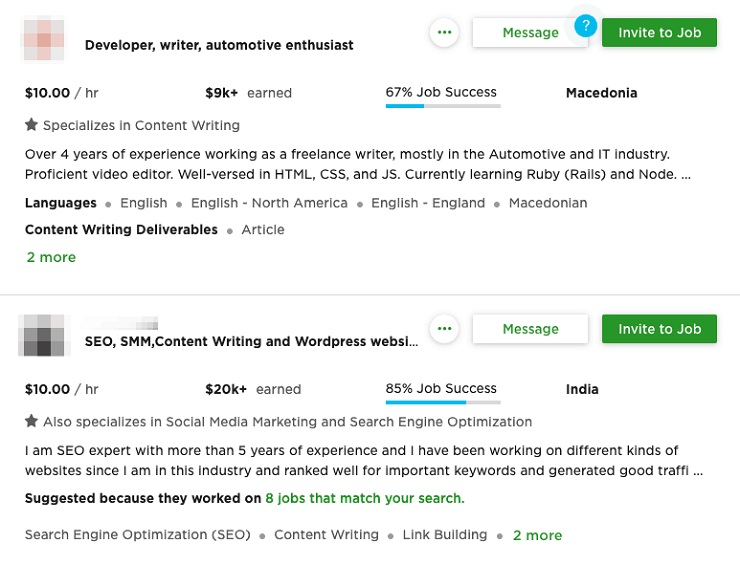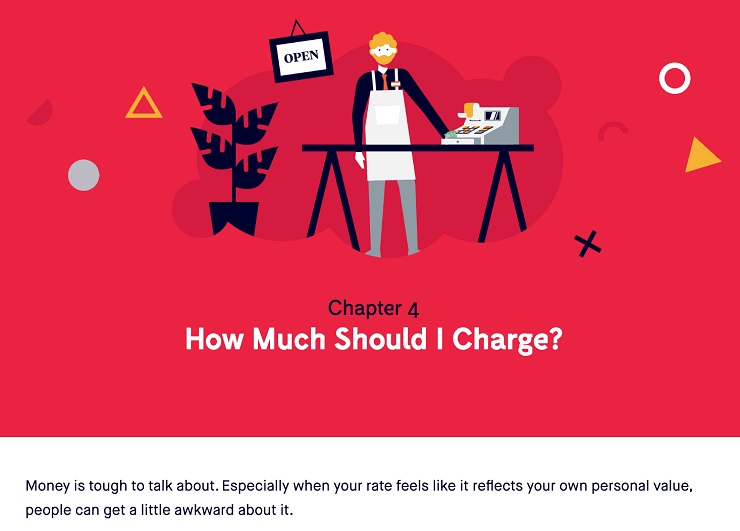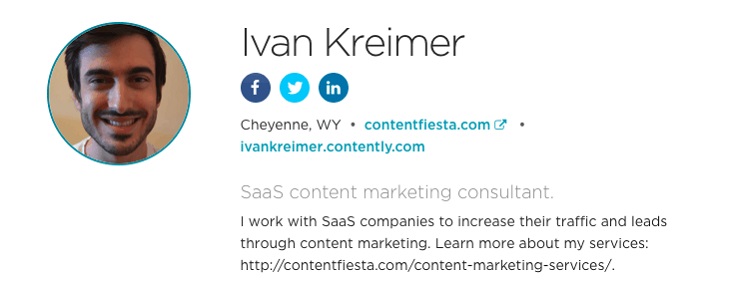Do you ever wish you could spend the entire day just reading, whether that’s reading books or articles from publications like The New York Times and Vox? Do you write for your own blog, or on platforms like Medium, just for fun?
If you’ve always wanted to become a professional writer, or otherwise had a passion for the written word, you may be able to use your talents to launch your own freelance business.
But before you take that plunge and quit your day job, you need to first understand just how you can leverage your passion for writing to make a profit.
I’m quite familiar with this topic because I’ve been there myself. Not long ago, I was a guy who loved to read and write blog posts for fun, but nothing more. I never thought I could become a freelance writer.
Eventually, I realized I could use my passion and skills to make money. And just six months later, I was a content writer, traveling the world!
When I put it that way, it sounds pretty easy. it wasn’t, of course. It took a lot work and had its ups and downs. But I followed a relatively simple process that allowed me to make the most out of this incredible opportunity, and ended up making more money than I did before I started.
So today, I want to share with you this very process so you can use it to follow your own dream of becoming a freelance writer.
EXCLUSIVE FREE TRAINING: Successful Founders Teach You How to Start and Grow an Online Business
Understand the Value of Your Writing
If you’re still with me at this point, I’ll assume you love reading and writing. Maybe you have your own pet projects, like a personal blog that you love to keep up to date. Maybe you love taking on writing assignments at the company you work for. Or maybe you simply wish you had more time to write.
Whatever the case may be, if you have a passion for the craft of writing, that is a great first step toward your goal of becoming a freelance writer, and a prerequisite for success. But there’s much more to it than just a love of writing. You also need to understand the business value of great writing.
For one, consider content marketing, my particular specialty. Content is a key element in any successful online business. It’s what drives user growth, sales, and brand building. Currently, 90% of companies market their businesses through online content.
What’s more, a Kapost study found that content marketing gets three times the leads per dollar spent compared to paid media, something that has enticed many companies to start using it as one of their top marketing channels.
Despite the great opportunity content marketing represents, if you jump right into pitching businesses about your writing services, you will face the problem 99% of freelance writers face: low rates.
Check all the freelance platforms like Upwork and Fiverr and you will see there are hundreds of people willing to work for a few cents a word.
You can’t compete with them—nor should you try. You need to position your writing services as a solution to an important need your clients have, and market yourself to communicate that clearly. Then you’ll be able to price your services correctly and generate the kind of income you deserve.
Some writers choose to price themselves on an hourly basis, some charge per word, and some charge based on the scope of the overall project. As Allie Decker recommends, you can base your rates on the amount of money you want to make.
There’s a lot to be said about pricing your writing—most of which is mentioned in chapter 4 of our guide to becoming a freelancer.
At the end of the day, I can’t tell you how much you can charge or how much specifically your content is worth. That’s something you have to research on your own and decide based on your own skills and experience, plus the ROI of the specific work you plan to offer your clients.
What matters is that you understand that you as a writer matter. Make yourself—your services, your value—stand out. Command what you’re worth and don’t forget that when you talk with your clients.
Define Your Ideal Client (and Niche)
Writers often assume that because any online business needs content, any online business could be their client. This is another attitude that will diminish your value as a freelancer. You need to narrow things down, and only work with clients who need your services and who will get the most value from them.
This is partly done by focusing on industries that have high margins and high demand for your type or style of writing. Examples include the marketing software industry, or the health and fitness ecommerce industry.
If you’re in doubt, go to a platform like Upwork or ProBlogger and check the fields that the companies who search for writers belong to.
Usually, the industries you find on ProBlogger and other freelance marketplaces are a great indication of demand, which indicates potential profitability. These sites are not the end-all, be-all, however. You can always directly pitch companies in the industries you’re most interested in.
Let’s say you want to write for the clinical health industry. In that case, you could search for “clinical health companies” and look for individual companies that show up as well as articles or directories that list companies in that industry.
Think deeply about the ideal customer you’d like to work with. A lot of this will be guided by your own skills and professional background, including your current or former job. Consider some of the following questions:
- What industries do you think best fit your passion? For example, if you love to travel, think about the tourism industry.
- What experience do you have? For example, if you have worked in academia or as a teacher, think about the education field.
- Are there any industries where you already have connections? For example, if you have worked as a sales rep for car dealerships, then think about starting in that industry.
Your ideal client should be a mix of the type of clients you’d like to work with and the companies that need your services.
Once you figure this out, you’ll be able to laser focus your positioning, your own marketing, and the likelihood you end up working with the right clients who are willing to pay for your services.
EXCLUSIVE FREE TRAINING: Successful Founders Teach You How to Start and Grow an Online Business
Develop a Brand
In order to sell anything to anyone online, you need to have a brand. Whether that brand is your name or an abstract representation of your ideals, a brand is what sets a company apart, even if that’s just a one-person operation like yours.
Your brand is your identity—it represents your values to the world.
There’s an entire science and art behind branding, most of which you don’t need to learn about right now. All you need to know at this stage is that before you can start selling your freelance writing services, you want to have a basic set of brand assets in places. That is:
- Your company’s name: This can be your name (e.g., “Ivan Kreimer, Inc.”) or a more abstract name like my company, Content Fiesta.
- Your value proposition: This sums up what you do, for whom you do it, and for what reason.
There are both advantages and disadvantages to picking your own name as your company name or using an abstract one. The main reasons you might use your name as your business name is that it’s easier to build trust with potential customers, as they can put a face to the business. It makes it more transparent and personal. You can even use it as a differentiation point (e.g., “you will get the content I write instead of overpriced content written by cheap ghostwriters”). That’s the case our own excellent writer Amy Rigby makes on her site.
On the other hand, using an abstract name can help you make your company look a bit more professional and well-established, instead of a one-person show.
If you plan to sell to large companies, then having an abstract business name can be useful. Even if you’re still a one-person business, it can help you look bigger than you are. Also, in the event that you grow your business fast, you can more easily hire employees and have them represent your company instead of your own personal brand.
Whatever the case, it’s best to decide this before you start to set up your website and some of the other visual assets that come with a brand.
Your value proposition is another key element of any successful business. You want to summarize what it is that you do and for whom.
It’s like a verbal business card. If a potential client asks you what you do, you can tell them your value proposition and they will be able to understand right away.
Since you already understand the value of your writing and you have a clearer idea of your ideal customer, developing a value proposition should be easy at this point.
Consider using the following positioning statement to present yourself:
For who , provides because
All you have to do is fill in the blanks. Another one of our amazing writers, Alaura Weaver, has this value proposition in her site, which summarizes and highlights her value proposition and target audience fast.
Once you have a name and a value proposition, you can think about creating images (or taking photos of yourself), developing a logo, picking your colors, a tagline, and so much more. You can then use these elements on your website.
But at the end of the day, these are nice-to-have elements of a successful brand. At the bare minimum, what truly matters is that you have a name and a value proposition set up before you can start commanding profitable rates.
Create a Portfolio
Any business needs a website these days. For a freelance writer, however, your online presence serves a very important, specific purpose.
Sure, it can be great to have a slick website complete with a dedicated blog, testimonials, etc. But building a website can take a long time. The bare minimum you need, in the beginning, is a portfolio of your past work. Think of this as a more streamlined and focused version of a website. You show the content you’ve written, your clients, nothing more.
More than anything, your clients care that you’re the right writer for their needs. They want to read your previous content and not much more. The effectiveness of a portfolio lies in its simplicity. Take a look at my own portfolio (mind you that it’s a bit outdated):
All you see there is my face (which works like my logo 😉), a simplified version of my value proposition, and my content. It doesn’t get any better than that.
When I first got started as a freelance writer, I used this to pitch my potential clients. I didn’t have a website. All I did was send them a link to my portfolio and that was it. I did the same thing when I applied to job postings.
And guess what? It worked. It helped me show the sites that I had written for (many of which were quite authoritative) and my clients loved it. Eventually, I started my own website and my results improved a bit more. But I wouldn’t have started without my portfolio.
My favorite portfolio tool is Contently. It’s free, it’s simple, and it’s the standard tool most freelance writers use.
You can also use other tools like Clippings.me or MuckRack, or create a really basic website with a portfolio page.
In case you have never written for anyone, or if you have done it as a ghostwriter and can’t add any content to your portfolio, I recommend you start guest blogging. It’s free publicity that will help you show your skills to potential clients. I’ve gotten many clients like that, so it’s a great way to build early momentum in your freelance writing career.
You can also inquire if any family or friends need writing services and work for them at a discounted rate to get some samples for your website.
Market Your Services
The dream of any freelance writer is to have companies pitching you for your services, and not the other way around. That’s your ultimate goal. But this is easier said than done.
At first, you will most likely be marketing your services to other companies. You will be the one doing the hard work of pitching. The better your pitch, the better your marketing, the higher the chances of getting new clients, and most importantly, of getting the right clients.
At first, you will have to work hard to build your portfolio and your network of clients. There are many ways you can market your freelance writing services:
- Cold emails
- Networking
- Blogging
- Going to conferences/meetups
- Paid ads
- Freelance platforms
- Writing platforms
- Job platforms
Within this large number of tactics you can use, it’s best if we separate your marketing into two categories:
- Short-term work
- Long-term work
The short-term work is the one that you do to get clients right away. It won’t be that effective, but it will help you get a few clients. This work includes making a list of potential clients (which you base on the ideal client you developed before), developing a high-value pitch, and cold-emailing them (more info on this in the resources provided at the end of this section).
You can also add to this list applying to job platforms like Upwork, or writing platforms like ProBlogger, and sending emails to people you know and who could be interested in your services.
It will take you a lot of time at first, but if you do it right—if your pitch is good, and your recipients are interested—you will get a few initial clients and kickstart your freelance career.
The long-term work is what you do to build a brand, and then reap the benefits in six to 12 months.
This work includes blogging on your site, guest blogging, networking, going to conferences, and using social media, among other things.
It’s better to get started with this work sooner than later. Otherwise, you will regret not doing this work beforehand when your initial set of clients dries up. But realistically speaking, know that these efforts probably won’t be profitable in the near term.
If you do both the short and long-term marketing work, you should build a strong foundation for the future while still making money today.
If you want more help promoting your freelance writing services, here are a few handy guides you will find useful:
- How to Become a Freelancer
- How to Make Your First $1,000 Freelancing
- The 5-Step Guest Blogging Strategy I Used to Increase My Traffic by 5x in 3 Months
- The Complete Guide to Getting Clients for Your Consulting Business, from Finding Prospects to Sealing the Deal (these tactics apply to any freelancer)
EXCLUSIVE FREE TRAINING: Successful Founders Teach You How to Start and Grow an Online Business
Enjoy the Life of a Freelance Writer
Freelance writing can be a wonderful new career that you adapt to your lifestyle. You can decide the amount of work you do and when you do it. You can work a few hours a week as a side business, or you can do it full time. You can work with the clients you like, command the prices that best fit your niche and skills, and enjoy your work.
By no means will this be easy. But if you put in the time and effort, you will reap the benefits of this great opportunity.
Are you considering starting a freelance writing career? What’s your #1 question you have right now that’s preventing you from starting?
Share your questions below and I’ll answer them as soon as possible!

























